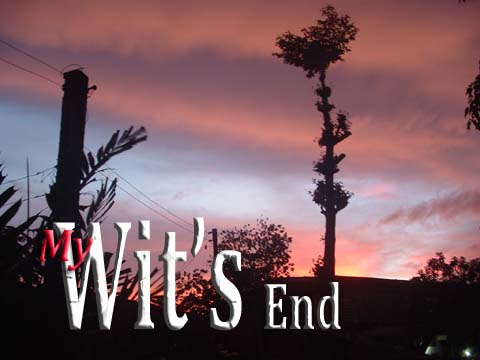CAGAYAN DE ORO CITY (MindaNews/11 June) – Before I had passion for writing, Emilio introduced me, first, to the joys of reading.
Emilio had a considerable collection of books. I remember the mini-library we had in the living room of our home in Villa Ernesto. They were sorted “biblically,” as Emilio used to call it; biblical because you have to seek before you could find a particular book.
An impressionable boy of nine, I remember watching Emilio pour into James Michener’s Chesapeake. The book looked formidable.
“How can you say you enjoy what you’re reading when there aren’t even pictures in that thick book?”
He said the descriptive words and phrases gave one a free-all-year-round movie passes to the best cinema in the universe–one’s mind. The beauty of reading is that you get to be the director, cinematographer and even the leading character or the arch nemesis of the story’s protagonist, Emilio explained.
For me (sa wala’y pabor-pabor), he taught me the best way to learn to cultivate the love for reading. He said that even if I only use the time I spend every time I had to go to toilet reading, I would be able to finish a book as thick as his Herman Wouk epic novels in a week.
And he was right. After a week, I was able to finish two books, The Greatest Salesman by Og Mandino and Jonathan Livingston Seagull by Richard Bach. Emilio did not impose a list of should-read titles. He just sort of unleashed me to enjoy any book in his collection.
Whenever I finished a book, we would then have a loose discussion about what part of the story piqued my interest and why. Emilio never made me answer questions like, what the moral of the story was or to identify key plot points of the story. Then, he’d share his favorite part of the story and how he identified himself in some of the story’s character.
Soon after, I was slowly turning into what Emilio called a “wild reader.” He used to tell me things like: “don’t be afraid to explore your mind,” or “those who are truly free are those who are not afraid to go the ends of their minds.”
Slowly, all those readings made me want to write, too. I wanted to learn how to describe bad weather, awkward situations and forlorn goodbyes as well as Graham Greene or Ernest Hemingway. I wanted to learn how Robert Ludlum and John LeCarre put readers at the edge of their seat.
One particularly somber noon, Emilio said we were going to play a writing game. He said I was ready. It was a simple game. He would write one sentence and I would write a sentence, too, but it should support Emilio’s sentence until a story unravels.
Our first try, set in World War II, went like this–and this became one of our inside jokes:
“I remember that fateful moonless October night by the beach as if it was like a millisecond ago” - Emilio
“The crackle of dried Talisay leaves were muffled by muted thuds of waves lashing the sandbar” - Cong
“It was moonless alright but the amber sparkles of what seemed like a myriad fireflies congregating around a Talisay beside my nipa hut gave the night a dreamy and magical ambiance” - Emilio
“Suddenly—like whiplash–two Japanese bastards came storming the beach and raped the women and cut the children down” - Cong
Of course, we never got to finish the story because Emilio, tears dripping from his eyes, could not stop laughing.
“Pachada! Now, that’s one sick story you got there. Posong ka gayud,” he said while slapping his knee still giggling.
I was a high school sophomore when Emilio had his fourth cardiac arrest. He wrote an opinion column, “Shrifts,” in one of the local dailies here. His fourth cardiac arrest would be my baptism of fire as he talked me into writing on his behalf. We would talk about current local issues—from the dramatic local political intramurals to the mundane every day gossip. It was clear to me then that Emilio wanted me to try writing as a career option.
He showed it in a funny albeit embarrassing way.
In 1997, I applied and got hired by a local daily. When news of me working in a daily newspaper reached Emilio—who at that time was working for Southern Philippines Development Authority in Davao City—one week old in the editorial office, I received a large carton. In it were, a micro cassette recorder, two boxes of blank micro cassette tapes, two boxes of size AA batteries, five steno pads, five ballpoint pens, a pair of sneakers, a Nikon AF with 15-50mm lens, a Konika flash, an analog light meter and a silver Cross pen.
Chief of reporters Froilan Gallardo and photojournalist Joey Nacalaban snickered as I took out the items one by one. “Bai, abi man tingali sa imong papa nga reporter ka,” Nacalaban teased me.
I was the daily’s layout artist. And because I am stuck in the editorial room for at least 12 hours every day—had no need of the items my overly excited father sent.
“This only means one thing, doy, your father really wants you to be a journalist like him,” Gallardo, who would later be my Editor-in-Chief, told me.
Papa—Emilio Velez Corrales—met our maker one July evening in 2006 due to complications of his diabetes and coronary problems. I started working as a journalist in 2008. My father—who had mentored me since I was nine—never had the chance to read any of my written works but the “Shrifts” I wrote on his behalf.
Pa, I have dedicated, ever since, all my written works as a continuing tribute to you. Happy Father’s Day to you—my father, my editor, my friend. (Cong Corrales is a reporter of MindaNews)
